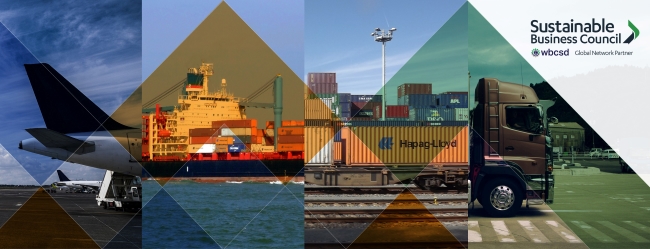Collaboration key to driving a new freight model
Climate Manager Kate Ferguson reflects on the successful SBC collaboration behind the pathway to decarbonise the freight sector, and the steps underway to now develop a model to implement some of the opportunities the work identified.

The recent IPCC Sixth Assessment report was our most stark warning that the next eight years is make or break for the planet. If we are to lessen the severity of impacts we will all face – we must do all we can to limit warming as individuals, and more importantly, work together to deliver solutions at the scale required.
A group of leading businesses in the freight sector worked together to develop a shared view on a pathway to decarbonise the sector by 2047, with a halving of emissions delivered by 2034 (vs 2019 baseline). SBC is now working to develop a model to implement the opportunities identified by the group that needed to be prioritised in the first two years. There has been a lot of interest from members in this work, so we are having an online workshop where you can come along and find out more.
The pathway showed the decarbonisation pathway will be delivered over three horizons:
- The short term horizon involves ensuring the current fleet is operating as efficiently as possible, minimizing freight movements and moving freight in the most efficient way.
- The medium term horizon sees the use of second generation (renewable) biofuel in the existing vehicle stock with biofuels to minimize emissions.
- The long term horizon utilises electrification of transport operations, through battery electric vehicles and fuel cell electric vehicles powered by hydrogen.
The work to progress the pathway findings has involved taking the priority actions and scoping up two workstreams to deliver on ways to decarbonise the fleet, and begin to engage customer mindset and change expectations in order to enable longer delivery times on low emission modes like coastal shipping and rail.
Central to the success of any collaboration are the people involved in the work. We are fortunate to have so many members and CLC signatories who have action to reduce emissions underway. Leading businesses understand the need to collaborate to deliver solutions at scale, as well as bring about changes to some of the more systemic issues holding them back.
But there is no denying collaboration against a backdrop of global and domestic supply chain disruptions caused by COVID and the invasion of the Ukraine will be hard, but we’re up for that challenge. Our freight pathway learnings, documented by Associate Professor Eva Collins of the Waikato Management School, showed good collaboration is about bringing together the right people in the right place at the right time. Members are telling us they are up for it, we have some key sector players engaged, and the IPCC have stressed yet again, the time is now.
